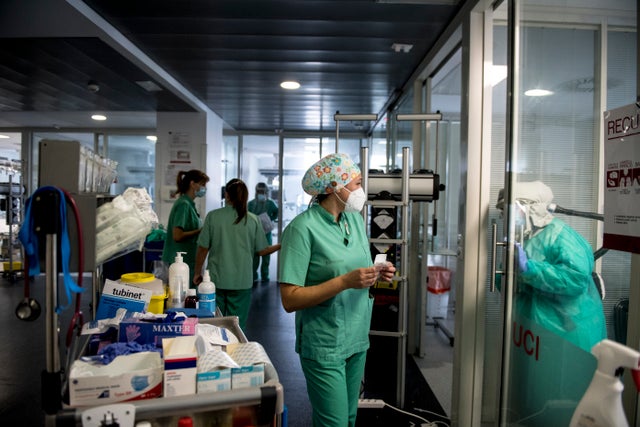Many countries in Europe are running out of intensive care beds amid a surge of coronavirus cases – as well as the doctors and nurses required to staff them.
In Italy, queues of ambulances can be seen parked outside hospitals awaiting beds for patients, while in France the government coronavirus tracking app prominently displays the intensive care capacity taken up by Covid-19 patients: 92.5 per cent and rising.
In the intensive care unit (ICU) in Barcelona, there is no end in sight for the doctors and nurses who have endured this situation already.
One hospital in the southern city of Marseille recently wheeled in refrigerated rental trucks ahead of a feared rise in ICU deaths there.
In Italy, Filippo Anelli, the head of the national doctors’ association, said at the current infection rate, there soon will not be enough physicians to go around.
Patients from France and the Netherlands are being evacuated to German intensive care units, but German doctors say they are watching the number of free beds dwindle quickly.
Germany has about 34.5 ICU beds per 100,000 inhabitants, not including the emergency reserves. Italy has 10, while France has 16.
Much of Eastern Europe, which was spared the harrowing wave last spring, is in the same position.
Hungary warned its ICU would run out of space by December under the worst-case scenario, and hospital cases in Poland have risen to three times the levels seen in the spring.
Late last month, American National Guard troops with medical training headed to the Czech Republic to work alongside doctors there, while the mayor of Prague took shifts at a hospital.
However, there are a few signs of hope.
Belgium, proportionally still the worst-hit nation in Europe when it comes to coronavirus cases, is seeing increasing indications of a turning point in the crisis after a partial lockdown.
Virologist Yves Van Laethem said hospital admissions seem to have peaked at 879 on November 3, and fell to about 400 on Sunday.
There were fears that the 2,000-bed ICU capacity would be reached last week, but Steven Van Gucht, a virologist with the Sciensano government health group, said the pace was slowing there as well.
“The high-speed train is slowing down”, at least for now, he said.








